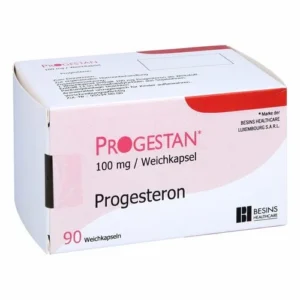Pharmacological action
A hormone identical to the natural hormone of the corpus luteum of the ovary. By binding to receptors on the surface of target organ cells, it penetrates the nucleus, where it activates DNA and stimulates RNA synthesis.
Promotes the transition of the uterine mucosa from the proliferative phase caused by the follicular hormone estradiol to the secretory phase. After fertilization, it promotes the transition to a state necessary for the development of the fertilized egg. Reduces the excitability and contractility of the muscles of the uterus and fallopian tubes. Promotes the formation of normal endometrium. Stimulates the development of the terminal elements of the mammary gland, induces lactation.
By stimulating protein lipase, it increases fat reserves and improves glucose utilization. By increasing the concentration of basal and stimulated insulin, it promotes the accumulation of glycogen in the liver and increases the production of pituitary gonadotropic hormones; reduces azotemia, increases nitrogen excretion in urine.
Indications for the active ingredients of the drug Progesterone
Infertility due to corpus luteum insufficiency.
Dosage regimen
The method of administration and dosage regimen of a specific drug depend on its form of release and other factors. The optimal dosage regimen is determined by the doctor. It is necessary to strictly observe the correspondence of the used dosage form of a specific drug to the indications for use and dosage regimen.
Contraindications for use
Deep vein thrombosis, thrombophlebitis; thromboembolic disorders (pulmonary embolism, myocardial infarction, stroke), intracranial hemorrhage or the presence of these conditions/diseases in the anamnesis; vaginal bleeding of unknown genesis; incomplete abortion; porphyria; established or suspected malignant neoplasms of the mammary glands and genitals; severe liver disease (including cholestatic jaundice, hepatitis, Dubin-Johnson syndrome, Rotor syndrome, malignant liver tumors) currently or in history; idiopathic jaundice, pruritus or herpes during a previous pregnancy; pregnancy, breastfeeding; age under 18 years (efficacy and safety have not been established); hypersensitivity to progesterone.
With caution
Cardiovascular diseases, arterial hypertension, chronic renal failure, diabetes mellitus, bronchial asthma, epilepsy, migraine, depression, hyperlipoproteinemia, mild to moderate liver dysfunction, photosensitivity.
Use during pregnancy and breastfeeding
Contraindicated during pregnancy and breastfeeding.
Warning: always consult a doctor before using medications.












